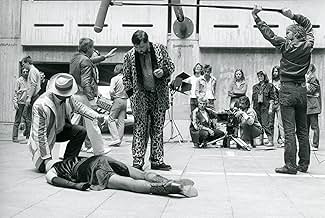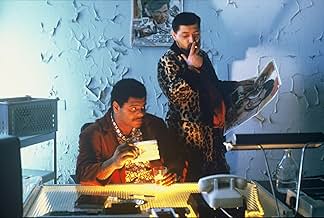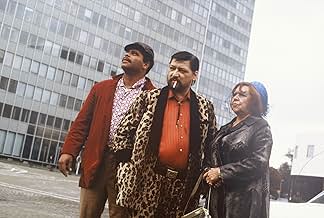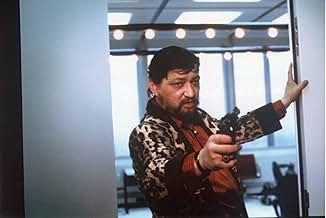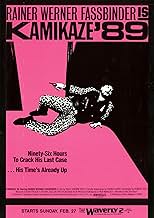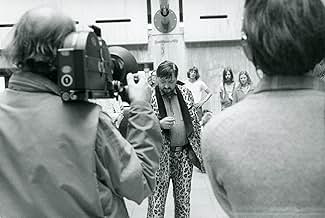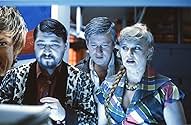In a totalitarian society of the future, in which the government controls all facets of the press, a homicide detective investigates a string of bombings, and finds out more than he bargaine... Read allIn a totalitarian society of the future, in which the government controls all facets of the press, a homicide detective investigates a string of bombings, and finds out more than he bargained for.In a totalitarian society of the future, in which the government controls all facets of the press, a homicide detective investigates a string of bombings, and finds out more than he bargained for.
- Director
- Writers
- Stars
- Awards
- 1 win & 3 nominations total
Andreas Mannkopff
- Wechselschichtregisseur
- (as Andreas Mannkopf)
Ute Koska
- Polizeiärztin
- (as Ute Fitz-Koska)
Hans-Eckart Eckhardt
- Polizist
- (as Hans-Eckhardt Eckhardt)
- Director
- Writers
- All cast & crew
- Production, box office & more at IMDbPro
Featured reviews
1989, to be precise. As imagined by Germans in 1982. Germany has become the world's foremost economic superpower, suicide is a thing of the past, and everyone does drugs, except there are no nasty side effects anymore. An overweight Rainer Werner Fassbinder mostly scowls his way through a quest to find out who's behind a series of murders that may be linked to a new resistance group. Or something like that. The plot seems secondary to the outrageous costumes (Fassbinder wears leopard tights throughout the whole film) and scenarios (like a police discotheque where you can shoot on firing ranges). It's an ugly film, and a stupid one, too, but it is perversely fascinating, and worth watching once, if only to impress your friends.
I see in Kamikaze 1989 both echoes and premonitions of other much more famous films, all with considerably larger budgets. I recognize that this must be because all dystopic fiction commences from the two greats, Orwell's 1984 and Huxley's Brave New World. What subsequent creators have done is to put the pieces together in different orders, but the overarching totalitarian force governing the dystopic world, whether Blade Runner or The Hunger Games, Brazil, Robocop, or this obscure work not by but starring Rainer Werner Fassbinder, who in a bizarre reflection of a recurring trope of the film, himself became at the young age of 37, in the year 1982 (the year of this film's release), "ein unerwarteter Tod" = an unexpected death.
I am not sure whether this film would have been much better had it had the budget of Blade Runner or The Hunger Games, but I suspect that it would have been. On the other hand, we have grown accustomed to and now expect extremely fast-moving, often frenetic action in dystopic films. The pace here is incredibly slow, as though everyone is on some sort of downers (aside from the contestants in the Laughing Game, who are hooked up to IVs filled with hebephrenia-inducing drugs). Again: Huxley and Orwell already wrote it and others inspired by their works decided to dramatize the essence of dystopia.
Worth watching once, if only to see how later films may have been influenced by this creation.
I am not sure whether this film would have been much better had it had the budget of Blade Runner or The Hunger Games, but I suspect that it would have been. On the other hand, we have grown accustomed to and now expect extremely fast-moving, often frenetic action in dystopic films. The pace here is incredibly slow, as though everyone is on some sort of downers (aside from the contestants in the Laughing Game, who are hooked up to IVs filled with hebephrenia-inducing drugs). Again: Huxley and Orwell already wrote it and others inspired by their works decided to dramatize the essence of dystopia.
Worth watching once, if only to see how later films may have been influenced by this creation.
This film comes across as a very ambitious project. It features Rainer Werner Fassbinder (only acting, he has no creative role in the project beyond that as far as I can tell) in the lead. It has appearances by Franco Nero and Brigitte Mira. Co starring is early Fassbinder regular Gunther Kaufman. The point is, the cast is pretty damn good.
The soundtrack is entirely original and is penned by Edgar Froese of Tangerine Dream. I am assuming that was not cheap for the producers to arrange.
With a good cast, good soundtrack, you have what appears to be a good futuristic sci fi script. An antihero cop and his partner are called in to organize an evacuation of the building for the most important corporation in the country (or world, was a little fuzzy of how far it reached). The bomb threat turns out to be a hoax, then things get twisted and confusing. I'd describe the story has having half devils battling half angels except you can't tell if they are fighting themselves or there really is a certain opposition. The film ends with major events not appearing on film. In fact, the film feels like it's missing most of the third act before coming to an abrupt conclusion. You sort of have closure during the very end but the exposition is coming from a news broadcast. It could have been thrown on in post production just to save the project and get it rushed to release in time to still cash in on the international success of Blade runner (both are futuristic sci fi stories but Blade Runner debuted a month before this), or perhaps to capitalize on the untimely death of Fassbinder who died unexpectedly 6 weeks before this film was released.
Regardless of the reasons, you get what might have been a complex story, well acted and brought to life via an interesting plot and without the need for cheap special effects. Alas, you get the pretense of a good story and are stuck trying to piece together the events in the second and third acts. It's a chore.
I've watched this several times. I, like most I imagine, was drawn to this movie if only to see the type of film project Fassbinder would simply act in without much more creative input. The film looked like it was trying to follow the same approach of Fassbinder sci fi experiments like World on a Wire. Maybe if Kamikaze '89 were almost three and a half hours long to explain what the heck is happening like World On A Wire is then perhaps things would be different. Instead, good luck with the 106 minutes you get.
The soundtrack is entirely original and is penned by Edgar Froese of Tangerine Dream. I am assuming that was not cheap for the producers to arrange.
With a good cast, good soundtrack, you have what appears to be a good futuristic sci fi script. An antihero cop and his partner are called in to organize an evacuation of the building for the most important corporation in the country (or world, was a little fuzzy of how far it reached). The bomb threat turns out to be a hoax, then things get twisted and confusing. I'd describe the story has having half devils battling half angels except you can't tell if they are fighting themselves or there really is a certain opposition. The film ends with major events not appearing on film. In fact, the film feels like it's missing most of the third act before coming to an abrupt conclusion. You sort of have closure during the very end but the exposition is coming from a news broadcast. It could have been thrown on in post production just to save the project and get it rushed to release in time to still cash in on the international success of Blade runner (both are futuristic sci fi stories but Blade Runner debuted a month before this), or perhaps to capitalize on the untimely death of Fassbinder who died unexpectedly 6 weeks before this film was released.
Regardless of the reasons, you get what might have been a complex story, well acted and brought to life via an interesting plot and without the need for cheap special effects. Alas, you get the pretense of a good story and are stuck trying to piece together the events in the second and third acts. It's a chore.
I've watched this several times. I, like most I imagine, was drawn to this movie if only to see the type of film project Fassbinder would simply act in without much more creative input. The film looked like it was trying to follow the same approach of Fassbinder sci fi experiments like World on a Wire. Maybe if Kamikaze '89 were almost three and a half hours long to explain what the heck is happening like World On A Wire is then perhaps things would be different. Instead, good luck with the 106 minutes you get.
A futurism crime thriller was a different venue for Fassbinder, whose stature had grown lately with films in historical settings. Though he didn't direct "Kamikaze," it was helmed by fellow New German filmmaker Gremm & has the moody complexity for which both directors are known, as well as more action. In the near future, West Germany's economy (remember, the fall of Communism was yet unforeseen) has become the world's largest. Virtually all broadcast & print media are controlled by a single, family-run corporation whose head (Gober) styles himself "The Blue Panther" & carefully crafts an elaborate personality cult, including a line of action comics. You still have a lot to learn, Rupert Murdoch. A terrorism campaign against the company by a nebulous entity called "Krysmopompas" (more impressive than "Osama," more intelligent than "Carlos the Jackal") brings on a police investigation headed by the force's most famous detective, Jansen (Fassbinder), who's never failed to solve a case. Clues indicate that someone well-placed in the corporation is responsible, but Jansen soon learns that the company itself is trying desperately to keep secrets. Is Krysmopompas really just an element of the Blue Panther personality cult? The story from Swedish writer Wahloo's novel "Murder on the 31st Floor" is frighteningly accurate in some of its visions, including the rise of cheap, inane reality TV (the marathon laughing contest is a classic) & the creation of euphemistic, self-serving police propaganda machinery (there's no such thing as murder or suicide anymore, only "accidental death"). The props are gleefully, stylishly cheap & cheesy, including Jansen's pajamalike leopard outfit, which might be some sort of uniform (remember Sylvia Anderson's purple wigs in "UFO?"), the burly assassins in black lingerie, the 3-wheeler choppers of the police & the Superman executive phone. However, they're no more outlandish than those of the wildly popular "Mad Max" films (Tina Turner in chain mail, oh, my!). Fassbinder does a remarkable job of projecting an air of old-fashioned, authoritative competence from Jansen through the futuristic absurdity, in contrast to the bland, painted-smile routine of the other cops & the worried urgings of his dying chief (Marquis). His relationship with his temperamental, long-suffering sidekick Anton (Kaufmann, Fassbinder's frequent collaborator & longtime companion) adds a complex human touch to the film. The brilliant Jansen is curtly condescending & critical ("Don't use unnecessary words, MK1 Anton") while the energetic Anton is alternately effusive & sullen. The portrayals of the media executives & personalities are delightfully bizarre & over-the-top, but probably less enjoyable if you don't understand German. The futurism venue was probably a good one for Fassbinder & Gremm (the latter's copious work remains almost unknown in the US) to venture out of the art-house domain of New German Cinema while keeping much of the technique that they had developed. Despite its similarity to "Soylent Green," "Kamikaze" is far less literal & direct but stylish beyond the point of parody. Hardly the most important work of the New Germans, "Kamikaze" is a valuable film in the near-future genre that died out in the 1980s but is about due for a revisit.
First off, yes, you're right, this is a godawful movie.
Being a big Fassbinder fan, I rented this with excitement. Fassbinder stars, and he's always fun to watch. It's one of those punk-future-dystopian movies that popped out a bit in the early '80s, always good for some cult fun. It came out at the end of Fassbinder's career, and Fassbinder's whole 12 year filmmaking period only got better and better until his end.
So half way through I thought "what the hell happened? This movie is an atrocity exhibition."
Then I glanced at the cover, and in horror noticed this movie was NOT directed by Fassbinder. He just starred in it in a coked up narcisstic haze. I read he actually wore that leopard outfit he was giving in this movie on and off again in the last few weeks of his life.
Fassbinder was proud of this movie, somehow, and that gives it an odd charm. It's horrendous, but I haven't regretted watching it. There's a scene where Fassbinder climbs to a roof of a building, odd buzzing music is playing and the wind is blowing his hair and he has this perverse smile on his face as he gazes out across the city. There's also the ending where Fassbinder, bloated, in a robe, girates his body against a photo of an astronaut (I'm guessing this is Fassbinder's input, as the exact same ending pretty much is used in Stationmaster's Wife). These two scenes made it worthwhile. Otherwise, mark it off as an awful "Alphaville" rippoff.
Being a big Fassbinder fan, I rented this with excitement. Fassbinder stars, and he's always fun to watch. It's one of those punk-future-dystopian movies that popped out a bit in the early '80s, always good for some cult fun. It came out at the end of Fassbinder's career, and Fassbinder's whole 12 year filmmaking period only got better and better until his end.
So half way through I thought "what the hell happened? This movie is an atrocity exhibition."
Then I glanced at the cover, and in horror noticed this movie was NOT directed by Fassbinder. He just starred in it in a coked up narcisstic haze. I read he actually wore that leopard outfit he was giving in this movie on and off again in the last few weeks of his life.
Fassbinder was proud of this movie, somehow, and that gives it an odd charm. It's horrendous, but I haven't regretted watching it. There's a scene where Fassbinder climbs to a roof of a building, odd buzzing music is playing and the wind is blowing his hair and he has this perverse smile on his face as he gazes out across the city. There's also the ending where Fassbinder, bloated, in a robe, girates his body against a photo of an astronaut (I'm guessing this is Fassbinder's input, as the exact same ending pretty much is used in Stationmaster's Wife). These two scenes made it worthwhile. Otherwise, mark it off as an awful "Alphaville" rippoff.
Did you know
- TriviaThis was the final acting role for Rainer Werner Fassbinder.
- GoofsThe movie claims 27 September 1989 to be a Monday, but that day was a Wednesday (The movie plays in 1989, as the title and a spoken intro make clear. The supposed explosion in the beginning of the movie was planned to take place on September 23, as Jansen points out. The chief of the police then urges Jansen to solve the case within for days, saying "until Monday afternoon," which would be September 27).
- Quotes
Policewoman: Suicide
Polizeileutnant Jansen: It would be the first in four years.
Policewoman: Sorry, I meant 'premature death.
- ConnectionsFeatured in Fassbinder (2015)
- How long is Kamikaze 89?Powered by Alexa
Details
Box office
- Gross US & Canada
- $22,440
- Opening weekend US & Canada
- $5,613
- Jun 5, 2016
- Gross worldwide
- $22,440
Contribute to this page
Suggest an edit or add missing content


